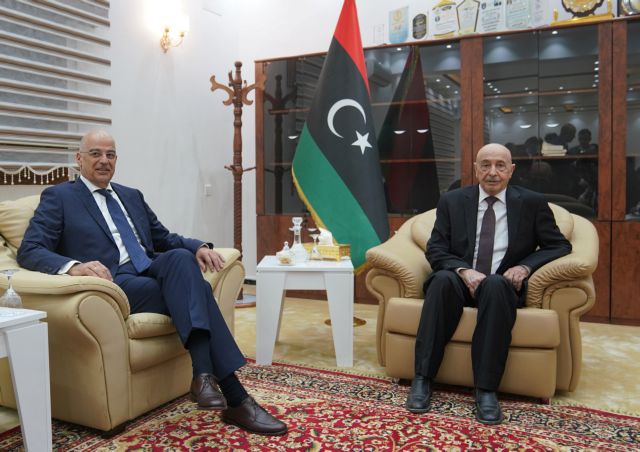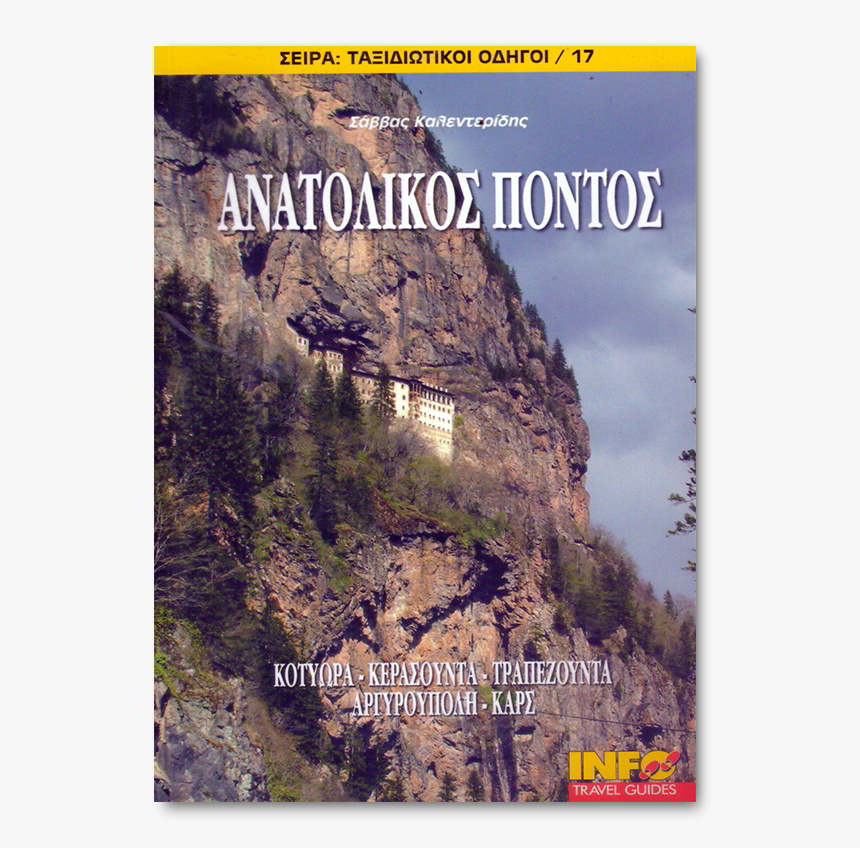Γενικά θέματα
The Truth About the Situation in Libya: Cutting through Government Propaganda and Media Lies
|
By Brian Becker
Libya is a small country of just over 6 million people but it possesses the largest oil reserves in all of Africa. The oil produced there is especially coveted because of its particularly high quality.
The Air Force of the United States along with Britain and France has carried out 7,459 bombing attacks since March 19. Britain, France and the United States sent special operation ground forces and commando units to direct the military operations of the so-called rebel fighters – it is a NATO- led army in the field.
The troops may be disaffected Libyans but the operation is under the control and direction of NATO commanders and western commando units who serve as “advisors.” Their new weapons and billions in funds come from the U.S. and other NATO powers that froze and seized Libya’s assets in Western banks. Their only military successes outside of Benghazi, in the far east of the country, have been exclusively based on the coordinated air and ground operations of the imperialist NATO military forces.
In military terms, Libya’s resistance to NATO is of David and Goliath proportions. U.S. military spending alone is more than ten times greater than Libya’s entire annual Gross Domestic Product (GDP) which was $74.2 billion in 2010, according to the CIA’s World Fact Book.
In recent weeks, the NATO military operations used surveillance-collecting drones, satellites, mounting aerial attacks and covert commando units to decapitate Libya’s military and political leadership and its command and control capabilities. Global economic sanctions meant that the country was suddenly deprived of income and secure access to goods and services needed to sustain a civilian economy over a long period.
“The cumulative effect [of NATO’s coordinated air and ground operation] not only destroyed Libya’s military infrastructure but also greatly diminished Colonel Gaddafi’s commanders to control forces, leaving even committed fighting units unable to move, resupply or coordinate operations,“ reports the New York Times in a celebratory article on August 22.
A False Pretext
The United States, United Kingdom, France, and Italy targeted the Libyan government for overthrow or “regime change” not because these governments were worried about protecting civilians or to bring about a more democratic form of governance in Libya.
If that were the real motivation of the NATO powers, they could start the bombing of Saudi Arabia right away. There are no elections in Saudi Arabia. The monarchy does not even allow women to drive cars. By law, women must be fully covered in public or they will go to prison. Protests are rare in Saudi Arabia because any dissent is met with imprisonment, torture and execution.
The Saudi monarchy is protected by U.S. imperialism because it is part of an undeclared but real U.S. sphere of influence and it is the largest producer of oil in the world. The U.S. attitude toward the Saudi monarchy was put succinctly by Ronald Reagan in 1981, when he said that the U.S. government “will not permit” revolution in Saudi Arabia such as the 1979 Iranian revolution that removed the U.S. client regime of the Shah. Reagan’s message was clear: the Pentagon and CIA’s military forces would be used decisively to destroy any democratic movement against the rule of the Saudi royal family.
Reagan’s explicit statement in 1981 has in fact been the policy of every successive U.S. administration, including the current one.
Libya and Imperialism
Libya, unlike Saudi Arabia, did have a revolution against its monarchy. As a result of the 1969 revolution led by Muammar Gaddafi, Libya was no longer in the sphere of influence of any imperialist country.
Libya had once been an impoverished colony of Italy living under the boot heel of the fascist Mussolini. After the Allied victory in World War II, control of the country was formally transferred to the United Nations and Libya became independent in 1951 with authority vested in the monarch King Idris.
But in actuality, Libya was controlled by the United States and Britain until the 1969 revolution.
One of the first acts of the 1969 revolution was to eliminate the vestiges of colonialism and foreign control. Not only were oil fields nationalized but Gaddafi eliminated foreign military bases inside the country.
In March of 1970, the Gaddafi government shut down two important British military bases in Tobruk and El Adem. He then became the Pentagon’s enemy when he evicted the U.S. Wheelus Air Force Base near Tripoli that had been operated by the United States since 1945. Before the British military took control in 1943, the facility was a base operated by the Italians under Mussolini.
Wheelus had been an important Strategic Air Command (SAC) base during the Cold War, housing B-52 bombers and other front-line Pentagon aircrafts that targeted the Soviet Union.
Once under Libyan control, the Gaddafi government allowed Soviet military planes to access the airfield.
In 1986, the Pentagon heavily bombed the base at the same time it bombed downtown Tripoli in an effort to assassinate Gaddafi. That effort failed but his 2-year-old daughter died along with scores of other civilians.
The Character of the Gaddafi Regime
The political, social and class orientation of the Libyan regime has gone through several stages in the last four decades. The government and ruling establishment reflected contradictory class, social, religious and regional antagonisms. The fact that the leadership of the NATO-led National Transition Council is comprised of top officials of the Gaddafi government, who broke with the regime and allied themselves with NATO, is emblematic of the decades-long instability within the Libyan establishment.
These inherent contradictions were exacerbated by pressures applied to Libya from the outside. The U.S. imposed far-reaching economic sanctions on Libya in the 1980s. The largest western corporations were barred from doing business with Libya and the country was denied access to credit from western banks.
In its foreign policy, Libya gave significant financial and military support to national liberation struggles, including in Palestine, Southern Africa, Ireland and elsewhere.
Because of Libya’s economic policies, living standards for the population had jumped dramatically after 1969. Having a small population and substantial income from its oil production, augmented with the Gaddafi regime’s far-reaching policy of social benefits, created a huge advance in the social and economic status for the population. Libya was still a class society with rich and poor, and gaps between urban and rural living standards, but illiteracy was basically wiped out, while education and health care were free and extensively accessible. By 2010, the per capita income in Libya was near the highest in Africa at $14,000 and life expectancy rose to over 77 years, according to the CIA’s World Fact Book.
Gaddafi’s political orientation explicitly rejected communism and capitalism. He created an ideology called the “Third International Theory,” which was an eclectic mix of Islamic, Arab nationalist and socialist ideas and programs. In 1977, Libya was renamed the Great Socialist People’s Libyan Arab Jamahiriya. A great deal of industry, including oil, was nationalized and the government provided an expansive social insurance program or what is called a welfare state policy akin to some features prevalent in the Soviet Union and some West European capitalist countries.
But Libya was not a workers’ state or a “socialist government” to use the popular if not scientific use of the term “socialist.” The revolution was not a workers and peasant rebellion against the capitalist class per se. Libya remained a class society although class differentiation may have been somewhat obscured beneath the existence of revolutionary committees and the radical, populist rhetoric that emanated from the regime.
As in many developing, formerly colonized countries, state ownership of property was not “socialist” but rather a necessary fortification of an under-developed capitalist class. State property in Iraq, Libya and other such post-colonial regimes was designed to facilitate the social and economic growth of a new capitalist ruling class that was initially too weak, too deprived of capital and too cut off from international credit to compete on its own terms with the dominant sectors of world monopoly capitalism. The nascent capitalist classes in such developing economies promoted state-owned property, under their control, in order to intersect with Western banks and transnational corporations and create more favorable terms for global trade and investment.
The collapse of the Soviet Union and the “socialist bloc” governments of central and Eastern Europe in 1989-91 deprived Libya of an economic and military counter-weight to the United States, and the Libyan government’s domestic economic and foreign policy shifted towards accommodation with the West.
In the 1990s some sectors of the Libyan economic establishment and the Gaddafi-led government favored privatization, cutting back on social programs and subsidies and integration into western European markets.
The earlier populism of the regime incrementally gave way to the adoption of neo-liberal policies. This was, however, a long process.
In 2004, the George W. Bush administration ended sanctions on Libya. Western oil companies and banks and other corporations initiated huge direct investments in Libya and trade with Libyan enterprises.
There was also a growth of unemployment in Libya and in cutbacks in social spending, leading to further inequality between rich and poor and class polarization.
But Gaddafi himself was still considered a thorn in the side of the imperialist powers. They want absolute puppets, not simply partners, in their plans for exploitation. The Wikileaks release of State Department cables between 2007 and 2010 show that the United states and western oil companies were condemning Gaddafi for what they called “resource nationalism.” Gaddafi even threatened to re-nationalize western oil companies’ property unless Libya was granted a larger share of the revenue for their projects.
As an article in today’s New York Times Business section said honestly: “”Colonel Qaddafi proved to be a problematic partner for the international oil companies, frequently raising fees and taxes and making other demands. A new government with close ties to NATO may be an easier partner for Western nations to deal with.”
Even the most recent CIA Fact Book publication on Libya, written before the armed revolt championed by NATO, complained of the measured tempo of pro-market reforms in Libya: “Libya faces a long road ahead in liberalizing the socialist-oriented economy, but initial steps— including applying for WTO membership, reducing some subsidies, and announcing plans for privatization—are laying the groundwork for a transition to a more market-based economy.” (CIA World Fact Book)
The beginning of the armed revolt on February 23 by disaffected members of the Libyan military and political establishment provided the opportunity for the U.S. imperialists, in league with their French and British counterparts, to militarily overthrow the Libyan government and replace it with a client or stooge regime.
Of course, in the revolt were workers and young people who had many legitimate grievances against the Libyan government. But what is critical in an armed struggle for state power is not the composition of the rank-and-file soldiers, but the class character and political orientation of the leadership.
Character of the National Transition Council
The National Transitional Council (NTC) constituted itself as the leadership of the uprising in Benghazi, Libya’s second largest city. The central leader is Mustafa Abdel-Jalil, who was Libya’s Minister of Justice until his defection at the start of the uprising. He was one of a significant number of Western-oriented and neoliberal officials from Libya’s government, diplomatic corps and military ranks who joined the opposition in the days immediately after the start of the revolt.
As soon as it was established, the NTC began issuing calls for imperialist intervention. These appeals became increasing panicky as it became clear that, contrary to early predictions that the Gaddafi-led government would collapse in a matter of days, it was the “rebels” who faced imminent defeat in the civil war. In fact, it was only due to the U.S./NATO bombing campaign, initiated with great hurry on March 19 that the rebellion did not collapse.
The last five months of war have erased any doubt about the pro-imperialist character of the NTC. One striking episode took place on April 22, when Senator John McCain made a “surprise” trip to Benghazi. A huge banner was unveiled to greet him with an American flag printed on it and the words: “United States of America – You have a new ally in North Africa.”
Similar to the military relationship between the NATO and Libyan “rebel” armed forces, the NTC is entirely dependent on and subordinated to the U.S., French, British and Italian imperialist governments.
If the Pentagon, CIA, and Wall Street succeed in installing a client regime in Tripoli it will accelerate and embolden the imperialist threats and intervention against other independent governments such as Syria and Venezuela. In each case we will see a similar process unfold, including the demonization of the leadership of the targeted countries so as to silence or mute a militant anti-war response to the aggression of the war-makers.
We in the ANSWER Coalition invite all those who share this perspective to join with us, to mobilize, and to unmask the colonial agenda that hides under the slogan of “humanitarian intervention.”
Brian Becker, National Coordinator, ANSWER Coalition
|
var _wau = _wau || []; _wau.push([“small”, “wvg1ie6mi5ta”, “m3y”]);
(function() {var s=document.createElement(“script”); s.async=true;
s.src=”http://widgets.amung.us/small.js”;
document.getElementsByTagName(“head”)[0].appendChild(s);
})();

Γενικά θέματα
Reuters: Το Ιράν προσλαμβάνει τρομοκράτες για χτυπήμα σε Ευρώπη και ΗΠΑ! Η αποτροπή χτυπήματος στην Ελλάδα
Την υπόθεση της απόπειρας τρομοκρατικού χτυπήματος στην Αθήνα τον Μάρτιο του 2023 επαναφέρει με νέο δημοσίευμά του το Reuters.

Στα τέλη του περσινού Μαρτίου ύστερα από συνεργασία της ΕΥΠ με τη Μοσάντ είχαν συλληφθεί δύο Πακιστανοί, που φέρεται να σχεδίαζαν τρομοκρατική επίθεση σε εβραϊκό εστιατόριο- συναγωγή στο κέντρο της Αθήνας.
Την υπόθεση της απόπειρας τρομοκρατικού χτυπήματος στην Αθήνα τον Μάρτιο του 2023 επαναφέρει με νέο δημοσίευμά του το Reuters. Το ειδησεογραφικό πρακτορείο σε ένα αναλυτικό ρεπορτάζ περιγράφει το πώς το Ιράν προσλαμβάνει τρομοκράτες για πλήγματα σε Ευρώπη και ΗΠΑ.
Στα τέλη του περσινού Μαρτίου ύστερα από συνεργασία της ΕΥΠ με τη Μοσάντ είχαν συλληφθεί δύο Πακιστανοί, που φέρεται να σχεδίαζαν τρομοκρατική επίθεση σε εβραϊκό εστιατόριο- συναγωγή στο κέντρο της Αθήνας.
Υπήρχε μάλιστα η πληροφορία ότι οι δύο άνδρες θα πληρώνονταν με 16.000 ευρώ για κάθε νεκρό, γι’ αυτό και σχεδίαζαν μαζικό χτύπημα.
«Καθώς η σύγκρουση Ιράν-Ισραήλ εντείνεται, η Τεχεράνη ταράζει τη Δύση με ένα κύμα απόπειρων χτυπημάτων και απαγωγών εναντίον στόχων στην Ευρώπη και τις Ηνωμένες Πολιτείες», αναφέρει το Reuters.
Η Ουάσιγκτον και οι σύμμαχοί της έχουν αναφέρει μια απότομη αύξηση τέτοιων συνωμοσιών που συνδέονται με την Ισλαμική Δημοκρατία. Από το 2020, υπήρξαν τουλάχιστον 33 απόπειρες δολοφονίας ή απαγωγής στη Δύση, στις οποίες οι τοπικές ή ισραηλινές αρχές ισχυρίζονται ότι συνδέεται με το Ιράν, διαπίστωσε το Reuters εξετάζοντας δικαστικά έγγραφα και επίσημες ανακοινώσεις.
Μεταξύ των πρόσφατων φερόμενων στόχων: ένα κτίριο που στεγάζει ένα εβραϊκό κέντρο και ένα εστιατόριο kosher στο κέντρο της Αθήνας. Από το κρησφύγετό του στο Ιράν, ένας Πακιστανός ονόματι Σαγιέντ Φαχάρ Αμπάς στρατολόγησε έναν παλιό γνώριμο που ζούσε στην Ελλάδα και τον οδήγησε να επιτεθεί στον χώρο, ισχυρίζονται οι ερευνητές σε έγγραφα που υποβλήθηκαν στις δικαστικές αρχές της υπόθεσης και τα οποία περιήλθαν στην κατοχή του Reuters. Ο Αμπάς είπε στην επαφή του ότι εργαζόταν για μια ομάδα που θα πλήρωνε περίπου 15.000 ευρώ ανά φόνο.
Σε μια ανταλλαγή WhatsApp τον Ιανουάριο του 2023 που περιγράφεται λεπτομερώς στα έγγραφα, οι δύο άνδρες συζήτησαν εάν θα χρησιμοποιήσουν εκρηκτικά ή εμπρησμό στην επίθεση. Ο Αμπάς τόνισε την ανάγκη παροχής αποδείξεων για απώλειες μετά το πλήγμα. «Υπάρχουν μυστικές υπηρεσίες», είπε, χωρίς να κατονομάσει. «Κάντε τη δουλειά με τρόπο που δεν αφήνει κανένα περιθώριο».
Τα έγγραφα που δεν είχαν αναφερθεί προηγουμένως περιλαμβάνουν εκατοντάδες σελίδες αποδεικτικών στοιχείων που συγκεντρώθηκαν κατά τη διάρκεια της προανακριτικής έρευνας στην Ελλάδα, συμπεριλαμβανομένων καταθέσεων μαρτύρων, αστυνομικών καταθέσεων και λεπτομερειών μηνυμάτων WhatsApp.
Οι ελληνικές αρχές συνέλαβαν τον Σιέντ Ιρτάζα Χάιντερ και έναν άλλο Πακιστανό πέρυσι, λέγοντας ότι η αστυνομία βοήθησε στην εξάρθρωση ενός τρομοκρατικού δικτύου που κατευθυνόταν από το εξωτερικό και είχε σκοπό να προκαλέσει «ανθρώπινη απώλεια». Οι δύο άνδρες αντιμετωπίζουν κατηγορίες για τρομοκρατία. Αρνούνται τις κατηγορίες.
Ο Χάιντερ, ο οποίος αφέθηκε ελεύθερος από την προφυλάκιση αυτή την άνοιξη με περιορισμούς, λέει ότι είναι αθώος. Σε συνέντευξή του, ο 28χρονος είπε στο Reuters ότι έστειλε στον Αμπάς εικόνες του κτιρίου αλλά εμπόδισε σκόπιμα να πραγματοποιήσει οποιαδήποτε επίθεση, ελπίζοντας να πληρωθεί χωρίς να βλάψει κανέναν.
Γενικά θέματα
Analysis: How Iran’s Ballistic Missiles Strike Israel?

The U.S. traced the launch location to a valley south of the Iranian city of Shiraz.
Eran has launched its largest-ever attack on Israel, firing 180 ballistic missiles
These missiles travelled more than 1000 Miles from this Valley to reach Israel most populated city and military sights.
Fattah-2, the successor to the Fattah-1, It was used for the first time and is one of Iran’s advanced missile systems.
This missile is equipped with a —inside it is the warhead—which detaches and allows the missile to maneuver and glide at speeds between Mach 5 and 10.
The missile has a range of around 1,500 km, only slightly more than its predecessor, the Fattah-1.
What sets it apart from other ballistic missiles is its ability to accelerate outside the Earth’s atmosphere, while its aerodynamic control surfaces enable steering to evades the famous Arrow Missiles Defense system made by Israel.
Γενικά θέματα
Τούρκος διπλωμάτης: «Η σιωπηλή συμφωνία Ερντογάν – Μητσοτάκη»
Τι σημαίνουν οι ομιλίες του Προέδρου Ρετζέπ Ταγίπ Ερντογάν και του πρωθυπουργού Κυριάκου Μητσοτάκη στη Γενική Συνέλευση του ΟΗΕ
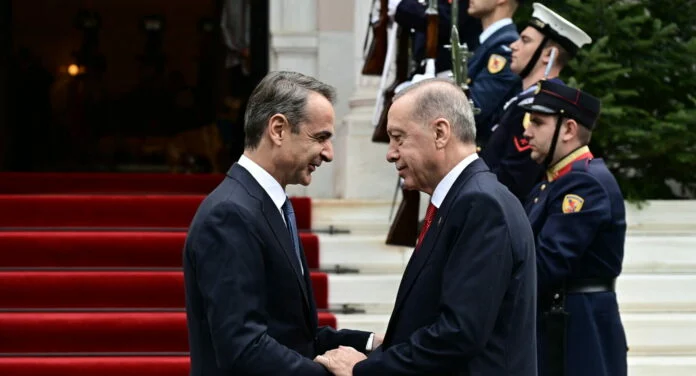
Κυριάκος Μητσοτάκης – Ρετζέπ Ταγίπ Ερντογάν: Ό,τι και να συμβεί στην Κύπρο, φαίνεται να υπάρχει σιωπηρή συμφωνία μεταξύ του προέδρου Ερντογάν και του πρωθυπουργού Μητσοτάκη ότι οι τουρκοελληνικές σχέσεις δεν πρέπει να επηρεαστούν αρνητικά, γράφει σήμερα ο Τούρκος, πρώην διπλωμάτης, Χασάν Γκιογκούς στο T24.
Τι σημαίνουν οι ομιλίες του Προέδρου Ρετζέπ Ταγίπ Ερντογάν και του πρωθυπουργού Κυριάκου Μητσοτάκη στη Γενική Συνέλευση του ΟΗΕ
Οι τουρκοελληνικές σχέσεις στη νέα εποχή που επικεντρώνονται σε θετική ατζέντα πέρασαν από σοβαρές δοκιμασίες τον τελευταίο μήνα.
Παρακολουθήσαμε ελληνικά σκάφη εφόδου να παραβιάζουν τα τουρκικά χωρικά ύδατα, πρώτα στα ανοιχτά της Αλικαρνασσού και μετά με διαφορά μίας εβδομάδας στη Ντάτσα και στο Τουργκούτ Ρέις.
Στις δύο πρώτες περιπτώσεις, η ελληνική πλευρά υποστήριξε ότι κυνηγούσαν βάρκες που μετέφεραν λαθρομετανάστες.
Αυτό που συνέβη με το αλιευτικό Barbaros κοντά στο Turgut Reis ήταν ένας τύπος που συναντάμε συχνά στο Αιγαίο, λόγω της έλλειψης καθορισμένων θαλάσσιων συνόρων, και μπορεί πλέον να θεωρείται συνηθισμένη περίπτωση.
Για κάποιο λόγο, περιστατικά παρενόχλησης συμβαίνουν είτε στον αέρα είτε στο έδαφος πριν συναντηθούν οι ηγέτες και των δύο χωρών.
Υπάρχουν εκείνοι που ευδοκιμούν στο περιβάλλον κρίσης τόσο στην Ελλάδα όσο και στην Τουρκία.
Τα προκλητικά δημοσιεύματα μιας εφημερίδας έπαιξαν σημαντικό ρόλο στην όξυνση της κρίσης των Ιμίων το 1996.
Αυτή τη φορά, είχαμε τηλεοπτικά κανάλια που για μέρες έκαναν φασαρία για το πώς «οι μπότες του Έλληνα στρατιώτη άγγιξαν τουρκικά εδάφη».
Θα νομίζατε ότι η Ελλάδα επιχείρησε να εισβάλει στην Τουρκία αποβιβάζοντας έναν από τους στρατιώτες της με ένα μόνο σκάφος εφόδου.
Δεν μπορεί να ειπωθεί ότι οι ‘Παλικαράδες’ (Palikaryanın) είναι ο πιο πειθαρχημένος στρατιώτης στον κόσμο.
Στα χρόνια που ήμουν πρέσβης στην Αθήνα, είδα μια ομάδα στρατιωτών κομάντο να φωνάζουν συνθήματα κατά τη διάρκεια μιας επίσημης παρέλασης σε μια ελληνική εθνική εορτή.
Επειδή δεν ξέρω ελληνικά, στην αρχή νόμιζα ότι φώναζαν κάτι σαν «δώσε μου τη χαρά».
Η αλήθεια του θέματος φάνηκε όταν είδα την είδηση στις εφημερίδες της επόμενης ημέρας ότι κάποιοι στρατιώτες φώναζαν συνθήματα κατά της Βόρειας Μακεδονίας και της Τουρκίας στην εκδήλωση.
Αυτό που θα πω είναι ότι είναι πολύ πιθανό οι παραβιάσεις των τουρκικών χωρικών υδάτων να προκλήθηκαν από την ευρηματικότητα λίγων συνειδητοποιημένων Ελλήνων στρατιωτών που δεν έδρασαν με οδηγίες.
Τι σημαίνουν οι ομιλίες του Προέδρου Ρετζέπ Ταγίπ Ερντογάν και του πρωθυπουργού Κυριάκου Μητσοτάκη στη Γενική Συνέλευση του ΟΗΕ ;
Το θετικό κλίμα στις τουρκοελληνικές σχέσεις αποτυπώθηκε και στις ομιλίες των ηγετών των δύο χωρών στην τελευταία Γενική Συνέλευση των Ηνωμένων Εθνών.
Τόσο ο Πρόεδρος Ερντογάν όσο και ο πρωθυπουργός Μητσοτάκης φρόντισαν να μην κάνουν δηλώσεις που θα ενοχλούσαν ο ένας τον άλλον στις ομιλίες τους.
Μαθαίνουμε από τον ελληνικό Τύπο ότι αυτό το θετικό κλίμα αναμένεται να συνεχιστεί κατά κάποιο τρόπο, με βήματα όπως η επανέναρξη των συζητήσεων για τα προβλήματα στο Αιγαίο και η έναρξη λειτουργίας της σχολής της Χάλκης.
Εξελίξεις στην Κύπρο
Ωστόσο, όταν πρόκειται για την Κύπρο, προκύπτει μια διαφορετική εικόνα και βαθιές διαφορές απόψεων.
Ο Πρόεδρος Ερντογάν έκλεισε εντελώς την πόρτα περί ομοσπονδίας για μόνιμη λύση στην Κύπρο στη Νέα Υόρκη.
Ακολούθησε μάλιστα μια πιο επιθετική γραμμή από τον Πρόεδρο των Τουρκοκυπρίων Ερσίν Τατάρ , ο οποίος, πριν από την αναχώρησή του για τη Νέα Υόρκη, έδειξε ότι θα μπορούσε να καθίσει ξανά στο τραπέζι εάν ικανοποιούνταν οι απαιτήσεις της «άμεσης επαφής, απευθείας εμπορίου και άμεσης μεταφοράς» που συνοψίζονται σε τρεις λέξεις…
Ο Πρωθυπουργός Μητσοτάκης, που ανέβηκε στο βήμα μετά τον Πρόεδρο Ερντογάν, χαρακτήρισε κατοχή ως συνήθως τη στρατιωτική παρουσία της Τουρκίας στο νησί και είπε κατηγορηματικά ότι η επιλογή των δύο κρατών δεν μπορεί και δεν θα είναι λύση.
Ο Έλληνας πρωθυπουργός μίλησε με τρεις λέξεις με εντελώς διαφορετικό θέμα, δηλώνοντας ότι η Ελλάδα, η οποία θα είναι μη μόνιμο μέλος του Συμβουλίου Ασφαλείας του ΟΗΕ για 2 χρόνια από την 1η Ιανουαρίου, βασίζεται στις αρχές του «διαλόγου, διπλωματίας και δημοκρατίας» (3D), που προέρχονται από την ελληνική γλώσσα. Δήλωσε ότι θα ενεργούσε με βάση αυτές.
Συνάντηση Τατάρ-Γκουτέρες
Ο πρόεδρος των Τουρκοκυπρίων Ερσίν Τατάρ συναντήθηκε με τον Γενικό Γραμματέα του ΟΗΕ Αντόνιο Γκουτέρες στη Νέα Υόρκη το περασμένο Σαββατοκύριακο.
Στη δήλωσή του μετά τη συνάντηση, ο Πρόεδρος Τατάρ είπε ότι η επανάληψη των διαπραγματεύσεων θα μπορούσε να είναι δυνατή μόνο με την αναγνώριση της κυρίαρχης ισότητας και του ισότιμου διεθνούς καθεστώτος και ότι οι διαπραγματεύσεις που πραγματοποιήθηκαν σε διάφορες μορφές στη βάση της ομοσπονδίας για μισό αιώνα ήταν ασαφές γιατί η ελληνική πλευρά είπε «όχι» στο σχέδιο Ανάν με συντριπτική πλειοψηφία στο δημοψήφισμα.
Στη δήλωση μιας φράσης που έγινε από τον ΟΗΕ αναφέρθηκε ότι ο Γενικός Γραμματέας συναντήθηκε με τον ηγέτη της τουρκοκυπριακής κοινότητας Ερσίν Τατάρ και ότι στη συνάντηση συζητήθηκε πώς θα μπορούσε να προχωρήσει το Κυπριακό στο μέλλον.
Ο Γκουτέρες δέχθηκε τους επικεφαλής των αντιπροσωπειών από 21 χώρες την ίδια ημέρα. Είναι προφανές ότι η συνάντηση Τατάρ-Γκουτέρες δεν είχε μεγάλο περιεχόμενο.
Εν τω μεταξύ, πριν φύγει από τη Νέα Υόρκη, ο Πρόεδρος Τατάρ είπε σε ιδιωτική συνέντευξη σε εφημερίδα που δημοσιεύεται στην Κατεχόμενη Κύπρος ότι εάν η κυριαρχική ισότητα και το ισότιμο διεθνές καθεστώς γίνουν αποδεκτά από την ελληνική πλευρά και η ομοσπονδία δεν τεθεί στην ημερήσια διάταξη, μια συνάντηση στο 4+1 μορφή με τη συμμετοχή των μερών και του ΓΓ δηλώνει ότι μετέφερε στον Γκουτέρες ότι είναι έτοιμος να παραβρεθεί σε τριπλό δείπνο που θα παραθέσει.
Αν και εκ πρώτης όψεως η επιστροφή στο τραπέζι με ορισμένες προϋποθέσεις μοιάζει με πρωτοβουλία, δεν πρέπει να περιμένουμε από τους Έλληνες να αποδεχτούν εύκολα τους όρους που θέτει ο Τατάρ, που σημαίνει παραίτηση από την ομοσπονδία.
Ωστόσο, αυτές οι εξελίξεις δείχνουν ότι ορισμένες διαπραγματεύσεις διεξάγονται κεκλεισμένων των θυρών, αν όχι γύρω από το τραπέζι.
Το τριπλό δείπνο, το οποίο δέχτηκε ο Τατάρ, αναμένεται να γίνει ανεπίσημα στη Νέα Υόρκη στις 15 Οκτωβρίου. Πιθανώς, ο Γενικός Γραμματέας θα θέλει να ενημερώσει τους Τουρκοκύπριους και τους Ελληνοκύπριους ηγέτες για τον νέο οδικό χάρτη που επεξεργάζεται για την Κύπρο και να πάρει τις απόψεις τους σε αυτό το δείπνο.
Πού θα οδηγήσει αυτό;
Είναι δύσκολο να μαντέψει κανείς. Σε μια εποχή που έχει αρχίσει να ρέει αίμα στον Λίβανο μετά τη Γάζα και ο πόλεμος Ρωσίας-Ουκρανίας συνεχίζεται για περισσότερα από δύο χρόνια, ο Γενικός Γραμματέας, που φαίνεται βέβαιο ότι δεν θα επανεκλεγεί ποτέ, θέλει να καταλήξει σε ένα νέο σχέδιο για την Κύπρο; Αυτό είναι ένα ξεχωριστό ζήτημα.
Ό,τι και να γίνει στην Κύπρο, φαίνεται να υπάρχει σιωπηρή συμφωνία μεταξύ του προέδρου Ερντογάν και του πρωθυπουργού Μητσοτάκη ότι οι τουρκοελληνικές σχέσεις δεν θα επηρεαστούν αρνητικά.
ΠΗΓΗ: Βαλκανικό Περισκόπιο
-
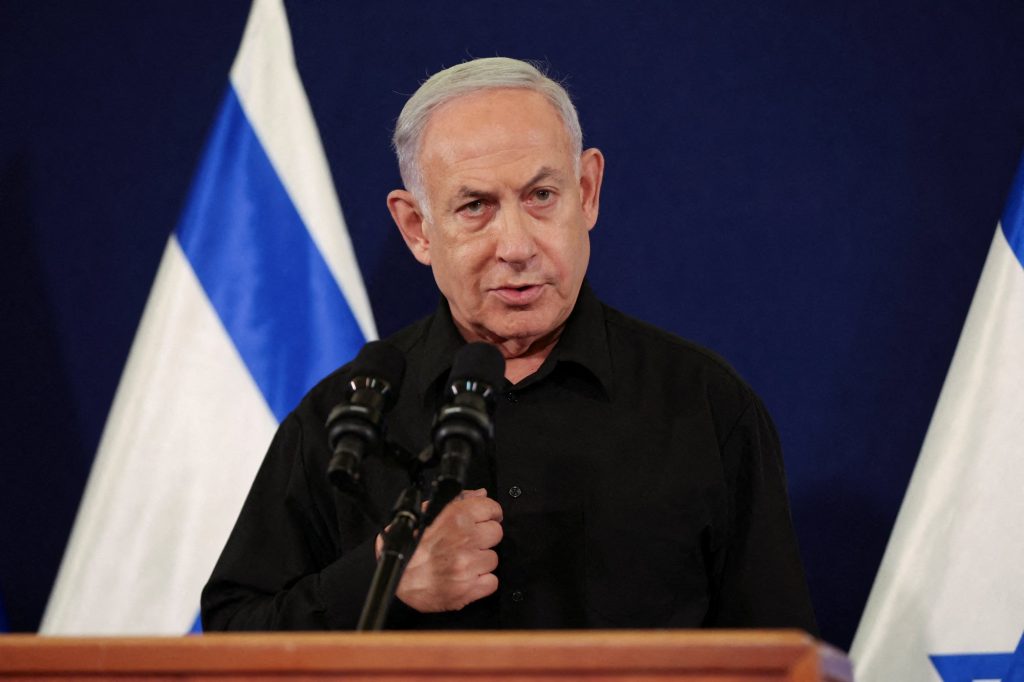
 Ιράν1 ημέρα πριν
Ιράν1 ημέρα πρινKίνηση υψηλού ρίσκου του Ισραήλ! Δεν αποκλείει χτύπημα στα πυρηνικά του Ιράν ο Νετανιάχου – Πότε θα χτυπήσει;
-
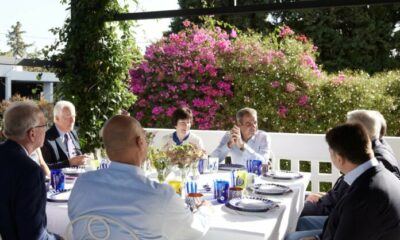
 Εξωτερική Πολιτική1 ημέρα πριν
Εξωτερική Πολιτική1 ημέρα πρινΣτο επίκεντρο η ελληνοαμερικανική συνεργασία σε συνάντηση του Μητσοτάκη με Αμερικανούς γερουσιαστές στα Χανιά
-

 Γενικά θέματα1 ημέρα πριν
Γενικά θέματα1 ημέρα πρινΜία νέα αρχή για το «Γεωπολιτικό»
-
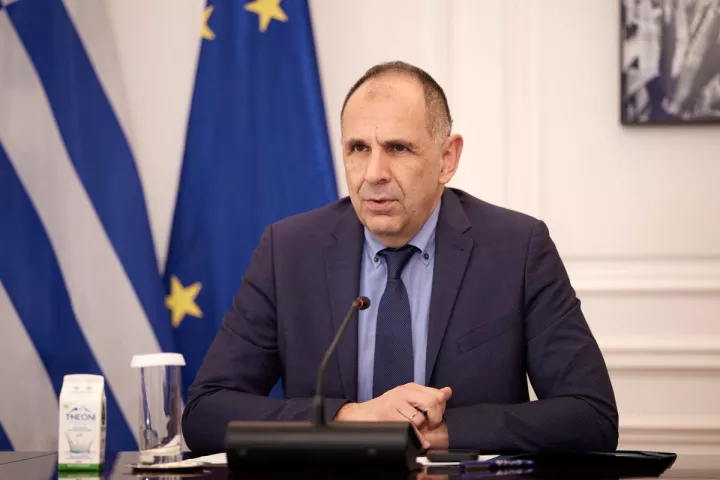
 Αναλύσεις - Γνώμες1 ημέρα πριν
Αναλύσεις - Γνώμες1 ημέρα πρινQuo vadis κύριε Γεραπετρίτη;
-

 Αστυνομία23 ώρες πριν
Αστυνομία23 ώρες πρινΑποκάλυψη! Ειδικό λογικό ισραηλινής κατασκευής για μαζική αναγνώριση προσώπων αποκτά η ΕΛ.ΑΣ
-

 Πολιτισμός1 ημέρα πριν
Πολιτισμός1 ημέρα πρινΒαθιά σιωπή! Θλίψη και πένθος – Έφυγε ο σπουδαίος Μίμης Πλέσσας λίγο πριν κλείσει τα 100
-

 Video7 ώρες πριν
Video7 ώρες πρινLive: Σε νέα φάση ο πόλεμος στη Μέση Ανατολή! Δύσκολες στιγμές για την ανθρωπότητα
-

 Γενικά θέματα22 ώρες πριν
Γενικά θέματα22 ώρες πρινΤούρκος διπλωμάτης: «Η σιωπηλή συμφωνία Ερντογάν – Μητσοτάκη»





